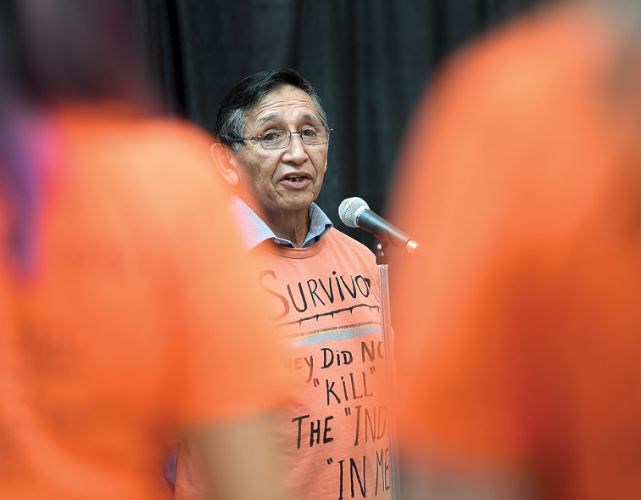He ponders during a moment of silence wearing a bright orange shirt which reads, "they do not kill the 'Indian' in me."
"This day is to remind me of what I went through. It was 10 years of my life, gone," said Clifford Quaw of the Lheidli T'enneh First Nation as he told a group of students of his emotional experience as a residential school survivor.
In the spirit of reconciliation and hope and in honour of survivors past and present, students, staff and faculty gathered at the College of New Caledonia for the annual Orange Shirt Day yesterday.
"CNC is celebrating Orange Shirt Day to continue the dialogue about reconciliation and raise awareness of experiences that Aboriginal children should never have endured and whose impact Aboriginal families still live with today," said Laurie Mercer, manager at of the Aboriginal Resource centre at CNC.
Orange Shirt Day is a national initiative which began in Williams Lake and continues to bring awareness to Canada's history of the residential school system and the intergenerational trauma still experienced today.
The orange shirt stands as a symbol because of one six-year-old girl, Phyllis (Jack) Webstad who will never forget her first day at a residential school in Mission, B.C.
"When I got to the Mission, they stripped me, and took away my clothes, including the orange shirt. I never wore it again. I didn't understand why they wouldn't give it back to me, it was mine! The colour orange has always reminded me of that and how my feelings didn't matter, how no one cared and how I felt like I was worth nothing. All of us little children were crying and no one cared," Webstad says on the Orange Shirt Day website.
Today, the shirt continues to hold meaning for the many atrocities faced by generations of Aboriginal, Metis and Inuit people.
For Heather Holland, a second year CNC student in the First Nations Specialization program, it's about being a voice for those who are unheard.
"My parents attended Lejac Residential School. They endured so much physical and mental abuse and I have also suffered and endured," Holland said. "We are all strong and resilient. Every child matters, every community matters. I matter, you matter."
The Lejac Indian Residential School was operated by the Catholic Church under contract to the Canadian government from 1922 to 1976. Being in the heart of Dakelh (Carrier) territory in Fraser Lake, many of the thousands of children who attended the school were of Dakelh descent but many also came from other communities, including Gitxsan, Wet'suwet'en and Sekani.
"The awareness campaign that 'every child matters' on this day translates to the priorities in our strategic plan here at CNC to ensure student success," said CNC president, Henry Reiser.
"We are honoured to work with indigenous people in the region. At CNC, every student does matter."
All six CNC campuses have Aboriginal Resource Centres and dedicated learning spaces for Aboriginal students with cultural advisors and elders who contribute to the learning and understanding of Aboriginal culture.
For Quaw despite the past, knew he wanted to make a difference and in 2009, he graduated as an instructor at Vancouver Community College.
"I never thought I could open my heart and my mind to learning," Quaw said. "I want everyone to know the impact of residential schools in B.C. and in Canada."



